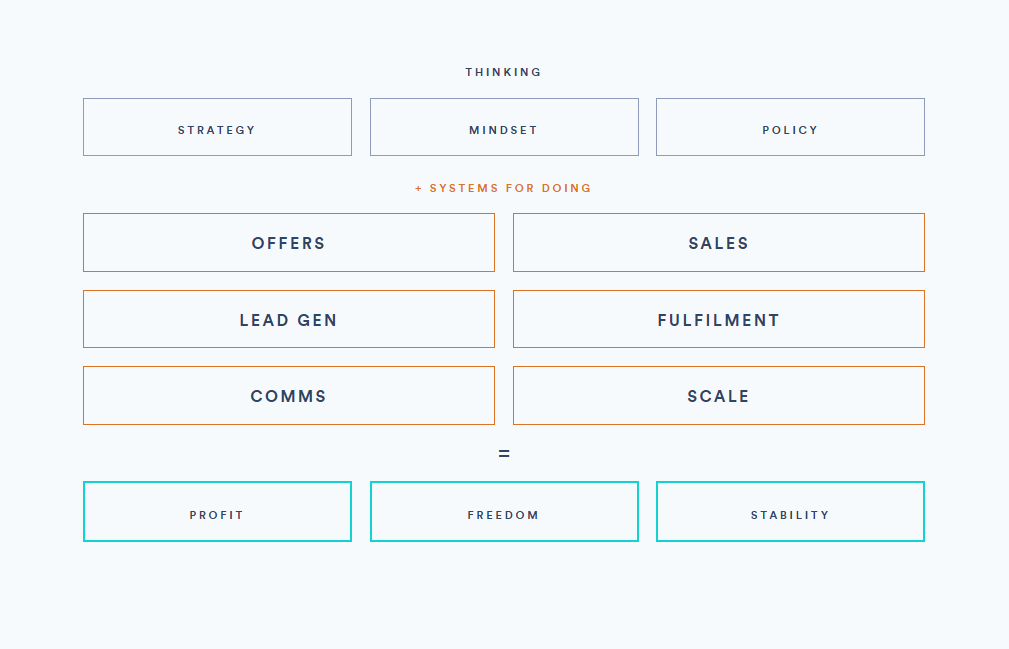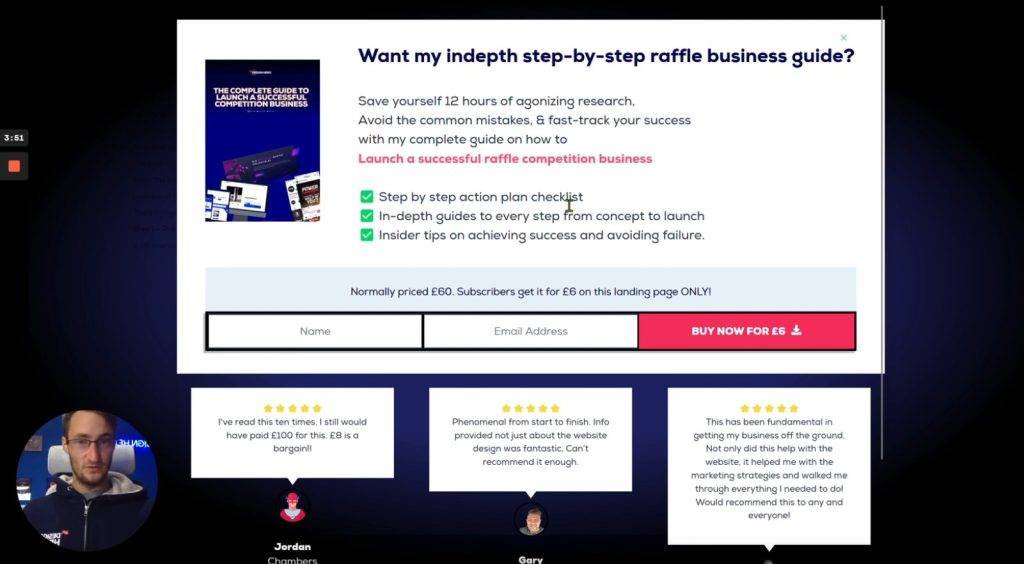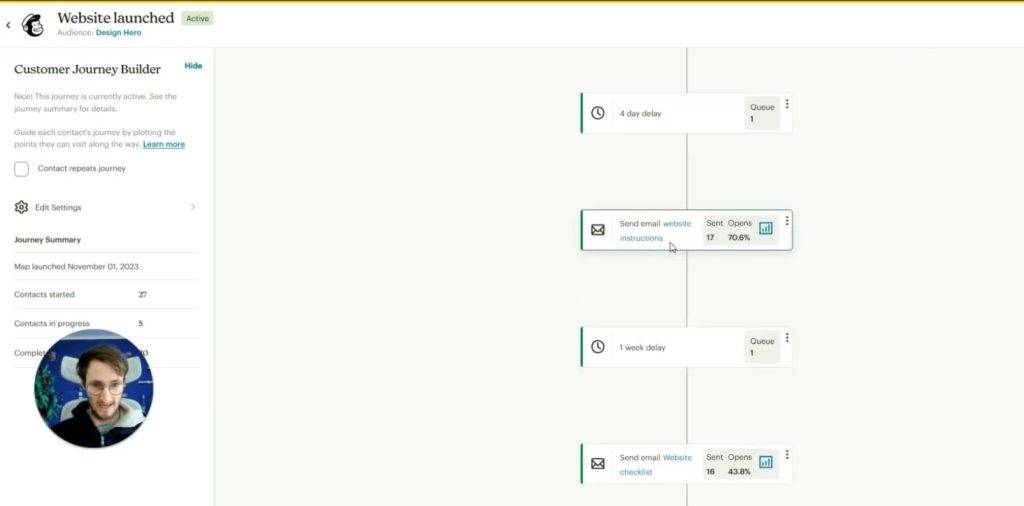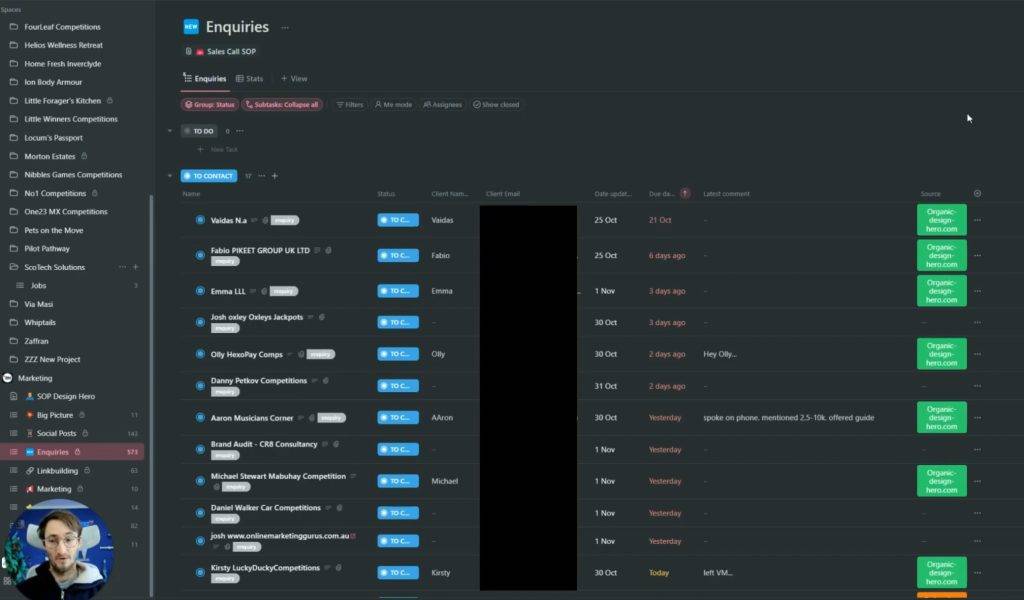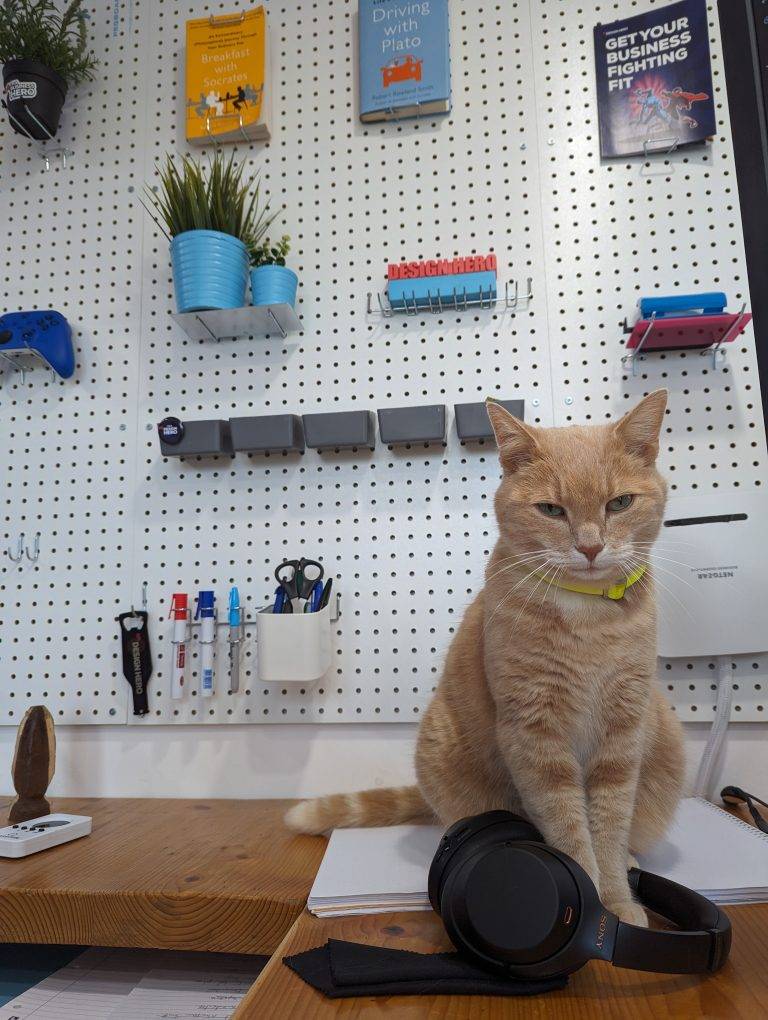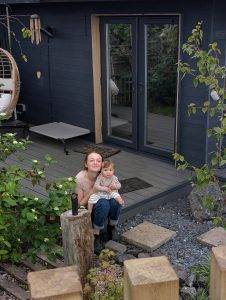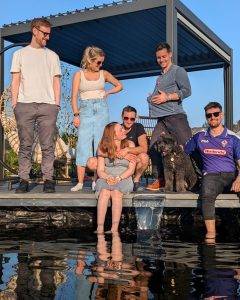This week I’m making a quick and dirty list of all the systems I use across Design Hero.
But first, why are these systems so important?
Most people start a business, then burn themselves out trying to grow it, and fit their life around what little time remains.
If you want to scale a business then you could go the traditional route of hiring people and scaling that way.
But then you’ll have to train them. and manage them. and that will cost time. and money.
If you want to run your business as a lifestyle business, the goal is to maximise profit and freedom, without just scaling up.
Systems for growing a lifestyle business
I want to help you design your lifestyle first, then build a lifestyle business around it, without the burnout.
If you do things the same way as everyone else, then the only way to get ahead is to do more and work harder.
Everyone says do this, do that.
So you’re going to need to think differently.
Most people default to more.
More leads, More ads, more engagement, more AI, More Tiktok, whatever the latest shiny object is…
But you won’t change your life by doing more of what your doing now.
In fact if you want more free time, you need to start doing less
You need to start over and get the foundations right first.
Sometimes the foundations can be boring.
But setting up foundational systems will allow you to run your business to maximise profit freedom and stability without just working harder,
and allow you to work more ON the business instead of IN the business.
The tools of solopreneuring
Any trade has it’s tools. So these are the tools of solopreneuring as I see them
⚖️ Policies & Boundaries
The prevention is always better than the cure. Sometimes I try to solve problems, only to realise I should be seeking to prevent that problem occurring. Boundaries and policies are rules to live and work by that help you avoid problems later.
📦 Templates
If you’re going to do something more than once, don’t start from scratch. Create a checkpoint you can use to skip the repeated parts.
📃 SOPS
Standard Operating Procedures. This is a step by step list of how to do things in your business. Even if you work by yourself, write them for yourself.
You can’t optimize your process if you don’t know what the process is.
You can’t delegate unless you have instructions.
Write it down. Now you can visualise what’s working and what’s not.
❌ Reduction
Writing your SOPs will reveal all sorts of steps, or parts you can cut from your process without affecting the result.
Before you try to do anything else, see what you can remove without breaking things.
🤖 Automation
Most repetitive tasks can be automated in some way. There are many tools and apps out now which integrate beautifully, to remove manual actions needed between steps. You can use something like Zapier to fill the gaps.
When you have a system running by itself without your input, you will feel like a superhuman 💪🏻
📅 Scheduling
It’s always quicker to do things in batches than one at a time.
Most tasks can be batched and scheduled for later. this includes social posts, most comms, emails, texts etc.
👨👩👧👦 Delegation
My last resort. If you’ve done all the above, and the system still needs human input and intuition, then it’s time to delegate to someone who can do it just as well as you, so that you can spend your more valuable time somewhere more critical, on a task that requires your specific knowledge.
⚙️ Systems
Now you have an optimized process which you can systemize. What’s the difference between an SOP and a system?
SOPs teach people how to do it, Systems are the actual doing. Setting up a system means combining your the SOPs, templates, automations, delegation etc into a repeatable process which can run on autopilot, or with minimal human input at critical points.
The Fundamental systems I use to run Design Hero
So these are the tools we use. Now what are the systems?
These are the foundational pillars of my lifestyle business.
Without them I would be an employee in my own business;
trapped under the weight of labour,
buried by an avalanche of admin,
suffering from undue stress
instead of doing high-value work and honouring my unique talents.
Under each foundation, there are systems which I’ll list here.
My plan is to write about each of these systems, in detail, and produce video walkthroughs for all of them.
If that sounds interesting, you can subscribe here to receive these to your inbox as I create them.
I’ll continue to retrospectively update this post as I add more content.
⚙️ Lifestyle Systems
Weekly Scheduling
Your time and how you spend it should operate on a system, so that your acting with intention instead of acting on other people’s whims.
I use a weekly schedule to keep myself working on the right things at the right time.
List of non-negotiables
A growing list of stuff I will and stuff I will not do. Has saved me from all sorts of trouble, and helps keep you on the right path.
Boundary setting
I’m putting this as as system because there is a method to this.
Monthly Checkin
Once a month, I do a macro review to make sure my actions are aligned with my overall goals in the longterm.
Weekly review
Once a week, I do a micro review to make sure I’m not losing sight of the goals, it’s easy to lose a week by getting sidetracked.
⚙️ Sales Systems
Sales Calls
Lead nurture
Project Proposals
Review Gathering
Sales funnels
I’ve written about my automated sales funnel and lead magnets here
⚙️ Lead Generation Systems
Enquiries CRM system
What gets measured gets managed.
Enquiry Nurture System
I have a system to automatically reach out to, and nurture, any enquiries who contact me.
There’s a brief sneak peek at it at the end of my 6 figure automated referral system
I’ll do another video about it sometime.
Referrals system
You are sitting on a goldmine of leads that you’ve probably forgotten about. I’ve written about my system for referrals on autopilot here.
SEO Linkbuilding
I build about 3-6 high quality, DoFollow links to my website every month using a guest blogging system.
Social Content generation
I write, my team repurposes. We create 1 month of content and schedule it in one sitting.
Social Engagement
Most people flip open social when they feel like it, and scroll mindlessly.
I treat Social as a business tool not entertainment. I spend 15mins a day on social media. To do this I condense my engagement into a system that I run through once a day on repeat.
⚙️ Comms Systems
This is where most people spend the best hours of their day:
Welcome to the admin zone. necessary work which adds no value to your business, or to your clients.
This is where simple systems and proper boundaries will have the biggest impact.
Notetaking & Ideation
Brains are for having ideas not storing them. get the ideas out, so your brain can have more ideas, and think about more important problems!
Asynchronous Comms.
Never have a meeting if a call will do. Never have a call if a Loom will do. Looms are video recordings with audio.
Looms allow asynchronous communication in high fidelity.
You can start to record a library of your SOPS. Sometimes you can also use this as content for social.
Call Scheduling & appointment booking
Most calls aren’t needed.
“can we jump on a quick 5 call?”
Nope, we can’t. Because 5 min calls don’t exist. It will take 25 mins. Plus another 10 going back and forth to arrange a date and time.
Set up a system where people can book calls with you, when it suits you best, without the to and fro
Here’s a complete run-through of the automated appointment booking system I use in detail to get back 12 hours a week
Calls
Sometimes a live conversation is required for complex topics. Zoom will save you a lot of travel time.
Emailing
Most people don’t know how to email properly. They treat it like a live chat service. Each emails they send generates more emails, whilst communicating little. So they waste all day in emails instead of doing. Start thinking like this:
Every email you send should move you closer to the goal in as few emails as possible.
There’s a system for this which will drastically cut your email requirements.
Email templates
Part of the above is never writing the same email twice. have a library of email templates for common responses.
⚙️ Fulfilment Systems
Client Onboarding
This is the first interaction after payment, a client is looking for a sign that you’re the right choice. Many people don’t have a system in place for this and fuck up the very first opportunity for a positive experience for the client.
Project management
I use one system to manage multiple projects for my design agency without getting overwhelmed. Each project is created from a template saving me hours of admin for new projects.
Briefs
Briefs should be everything someone needs to start and finish a project.
I also write briefs for myself, because they act as a checklist to make sure I have everything I need, and helps with ideation.
I have a system for the types of info I need for a project, whether it’s client work, internal marketing tasks, or a personal project
Feedback
We need a way to tease out, gather, interpret feedback. There’s a system for that.
Deadline systems
Always do what you say, in the time that you say it. I have a set of policies and systems for deadlines to ensure projects run on target, or that targets are adjusted accordingly.
Hiring talent
Always have a system in place for hiring when you need to, otherwise you’ll make poor decisions and hire the wrong person based on likeability.
I’ll be updating these systems as time goes on.
So that’s it!
This episode is as much me getting my ideation and organising my thoughts as it is a value post, but as times goes on I’ll be swinging back round and updating this with content and links so over time this will become a hub of systems for solopreneurs, with the goal of building a complete roadmap for running a lifestyle business on autopilot.
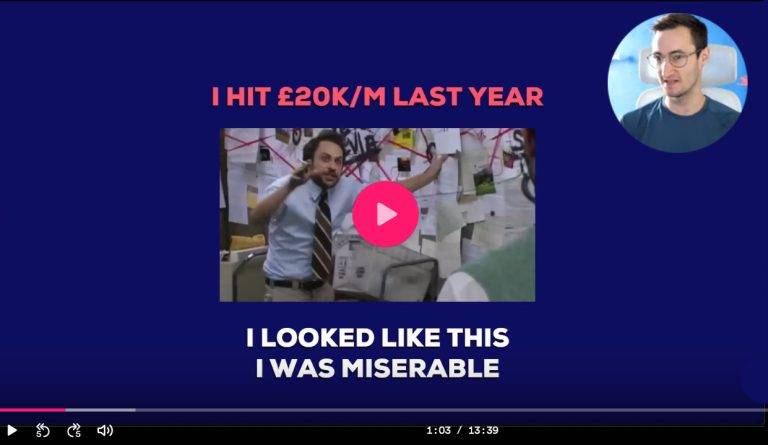
Want to grow a 6 figure lifestyle business with maximum Freedom?
Subscribe for instant access to Take my free training on lifestyle design. subscribe for instant access.
